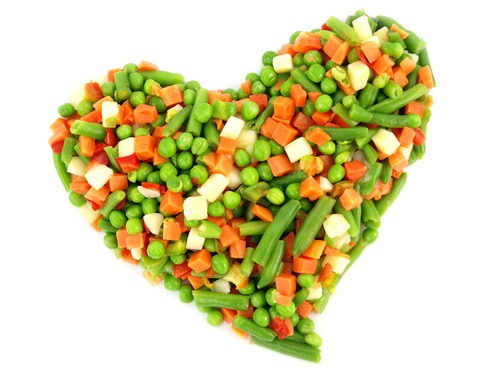 Do you buy fresh vegetables at the grocery store and then let them languish in the refrigerator because you can’t get around to preparing them? Fresh vegetables go bad quickly, and they’re more difficult to prepare than their frozen cousins. When you have a freezer full of frozen vegetables, getting your “daily nine” is as simple as tossing them into soups or heating them in the microwave and serving them with a healthy sauce.
Do you buy fresh vegetables at the grocery store and then let them languish in the refrigerator because you can’t get around to preparing them? Fresh vegetables go bad quickly, and they’re more difficult to prepare than their frozen cousins. When you have a freezer full of frozen vegetables, getting your “daily nine” is as simple as tossing them into soups or heating them in the microwave and serving them with a healthy sauce.
There are other advantages to keeping a stash of frozen vegetables in your freezer. Frozen veggies actually have greater nutritional value since they’re frozen quickly after they’re harvested. Fresh vegetables have to survive the journey to the market where they lose some of their vitamins along the way. They’re also more economical, especially if you let fresh vegetables go bad in the refrigerator before you get around to preparing them. Here are five types of frozen vegetables that deserve a special place in your freezer.
Frozen Spinach
Spinach is not only chock full of cell-protective antioxidants, but it also supplies more than a day’s requirement of vitamins K and A. It’s a good source of calcium, magnesium, and iron. Open a bag of spinach and you’ll quickly discover how versatile it is. Toss it into soups and stir it into your next omelet for added cancer-fighting power. Add spinach to lasagna and pizza or throw it into the blender with fruit to make a green smoothie.
Frozen Blueberries
Frozen blueberries are another healthy ingredient to add taste and color your next smoothie. Blueberries are rich in anthocyanins, antioxidants that rule when it comes to brain health. Some research shows they improve memory and help ward off age-related memory changes. They’re a natural for adding natural sweetness to plain yogurt and hot oatmeal. You can even suck on them while they’re frozen as “popsicle candy.” Keep a bag on hand when you have a taste for something sweet but can live without the processed sugar.
Frozen Broccoli
No list of healthy veggies would be complete without broccoli. Broccoli is rich in natural anti-cancer compounds that help the liver detoxify chemicals and other pollutants that increase the risk of cancer. They may also keep breast cancer at bay by their effects on estrogen metabolism. Add frozen broccoli to soups, casseroles, omelets, pizza or puree it into your green breakfast smoothie.
Frozen Red Bell Peppers
Red bell peppers don’t have the same heat as their hotter cousins, but they’re not lacking in health benefits. Red bell peppers are a good source of carotenoids, compounds with strong antioxidant, anti-inflammatory and anti-cancer properties. Carotenoids may also reduce the risk of some vision-related problems including macular degeneration of the eye and cataracts. Drop them into soups, stews or your next pot of chili or chop them up and add them to chicken or tuna salad. They’re also a natural for topping a pizza or adding color to an omelet.
Frozen Brussels Sprouts
No, they’re not America’s favorite vegetable, but Brussels sprouts have many of the same health benefits as broccoli. This isn’t surprising since they’re both members of the Brassica family of vegetables. That means Brussels sprouts have the same anti-cancer chemicals as other Brassica vegetables like kale, cabbage, cauliflower, Bok Choy and broccoli. The best way to enjoy their healthy goodness is to spray them with olive oil and roast them with a little garlic. Pop them out of the oven and you have an instant side dish that leaves potatoes in the dust when it comes to health.
The Bottom Line?
Keep these five frozen veggies on hand to make it easy for you to get your nine-a-day. Now there are no excuses.
References:
Cancer Epidemiol Biomarkers Prev. 2000 Aug;9(8):773-9.
World’s Healthiest Foods website.
Related Articles By Cathe:
Canned, Fresh, and Frozen Vegetables: Are They Equally Nutritious?
Why the Fruits & Vegetables You’re Eating Aren’t as Nutritious as They Could Be

